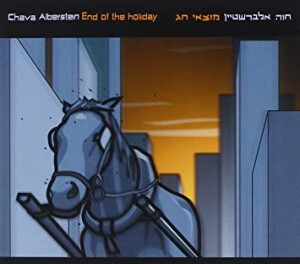 This review was contributed by Kate Danemark.
This review was contributed by Kate Danemark.
When I requested this CD of klezmer music I was expecting something totally different. Klezmer is upbeat, slightly discordant, generally obscure party-type music. Klezmer is “Hava Nagila.”
This is, well, different from that, for sure.
First, it sounds distinctly Spanish. That’s not right. It should be something that comes out of an accordion on a Brooklyn street. Though sung in Yiddish (with liner notes in both Yiddish and English) the rhythm just wasn’t right. There’s no comparing this to one of the best known examples of klezmer, the 1953 hit “Istanbul (Not Constantinople)” first made popular by The Four Lads, then later by They Might Be Giants.
I had a few issues to take up with Ms. Chava Alberstein, who obviously had not done her homework. Being the resident klezmer authority, (meaning I’d heard of it, as well as having heard some samples, unlike many people I know) I felt I had the right to challenge this inaccurate portrayal of this grand ethnic music. My own comeuppance occurred as soon as I began my homework. Aviv Productions’ website calls Alberstein “her country’s greatest singer,” as well as stating “Alberstein is Israel; her development as an artist mirrors Israel’s development as a country, her growing pains are Israel’s growing pains.”
Though born in Poland, Alberstein’s family moved to the newly established Jewish homeland when she was 4 years old. She says of her musical inspiration, “Even though I have lived in Israel nearly my entire life, I am constantly questioning my place in the world. Maybe this searching comes from being an artist, maybe it comes from being a Jew. I’m not really sure.”
Certainly the lyrics on this album, written by Nadav Levitan, are probing. It is hard to cull meaning from individual phrases among the lyrics, yet as a whole they subtly weave a pattern of a city, vacations, individual lives, a beach town emptying after the summer season. Ordinary things tinged with poignancy when Alberstein lends her whimsical music and sultry voice to the surprisingly modern stories.
The world music flair continues, covering everything from French bistro to American pop. Only at one brief point do I hear my anticipated accordion-heavy melody, and it is buried at the end of “Friday Night,” ninth track on the album. Instead there is mostly acoustic and classical guitar, both played by Alberstein. She is joined by Avi Agababa on drums and percussion and Ovad Efrat, (also the album’s producer) on bass and more acoustic guitar. Throughout the album wind samplings of woodwinds and synthesizer, as well as the aforementioned appearance by my beloved accordion!
Though the music on this CD is a lesson in style in itself, I recommend the Aviv website for further enlightenment on Alberstein, her influences and her distinctive style with this fabulous genre of music.
(Rounder, 2003)
